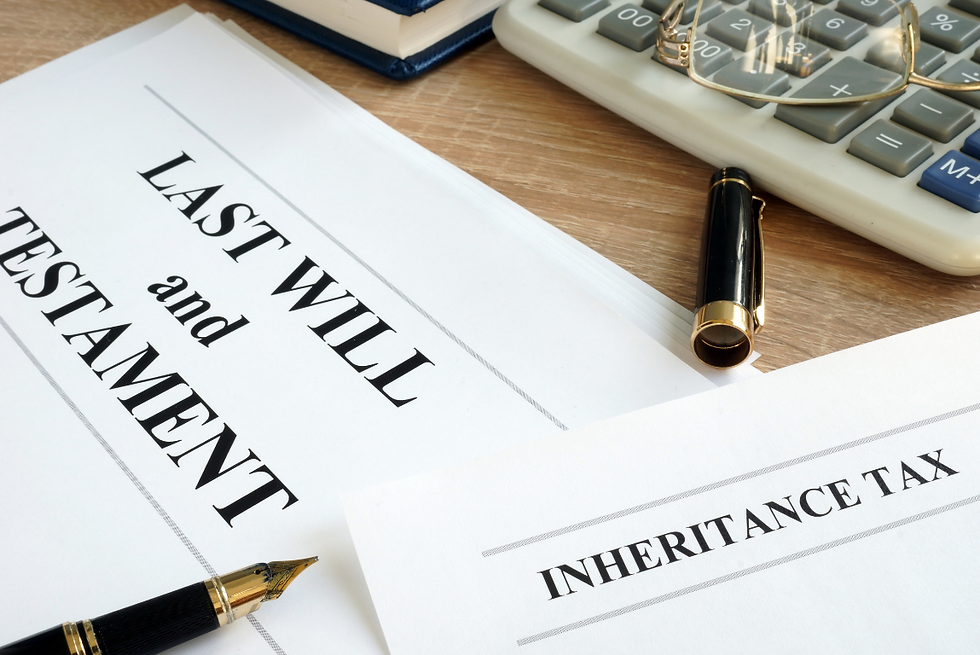What To Do After Receiving an Inheritance
- Dom Anton
- Apr 18
- 3 min read
Receiving an inheritance can be both a blessing and an overwhelming experience. Whether it includes money, property, or sentimental items, knowing how to manage it wisely is crucial. Here’s a step-by-step guide to help you make informed decisions while honoring the legacy you’ve received.

1. Reflect
The first and most important thing to do is to give yourself time to process. Receiving an inheritance often comes with emotional weight, as it’s usually tied to the loss of a loved one. Resist the urge to make any immediate decisions. Reflect on your financial goals and how this inheritance could play a role in achieving them. This will help you determine the best course of action for your situation.

2. Understand
Next, identify what exactly you’ve inherited. Is it cash, investments, real estate, or valuable possessions? Each type of asset may have specific legal or financial implications, so getting a clear picture of what you’re dealing with is key. Take inventory, including any associated documents like wills, trusts, or deeds.

3. Handle Immediate Financial Obligations
If the inheritance includes any debts or liabilities tied to the assets, make sure to address these promptly. Additionally, use part of the inheritance, if needed, to build or strengthen an emergency fund to safeguard your financial future.

4. Plan
Once you’ve had time to reflect, it’s important to create a plan for managing your inheritance. This is where working with the right professional team becomes pivotal. Moreover, this can also help you minimize potential conflicts with other heirs who may have a stake in the inheritance.
What is your "why"? Has it changed? Or is it the same? What does the new resource mean?

5. Plan Implementation
Once you understand your newfound assets and have sought advice, create a comprehensive plan. Would you like to invest for long-term growth? Pay down debts? Fund a dream project or retirement? Keep your priorities in mind and structure a roadmap that aligns with your personal and financial aspirations.

6. Avoid Impulse Spending
It may be tempting to indulge in extravagant purchases with a sudden windfall, but exercising caution is vital. Spending thoughtfully ensures that the inheritance will benefit both you and potentially future generations.

7. Revisit Your Own Estate Planning
Receiving an inheritance is a good reminder to review your own estate plans. Make sure your will, trusts, or beneficiary designations are up to date so your legacy can also be passed on smoothly.
Why Work with a Financial Advisor after Receiving an Inheritance?
Managing an inheritance can feel overwhelming, especially when emotions are running high. This is where a financial advisor can make a world of difference. With their expertise, they can help you create a clear plan to manage your inheritance wisely, ensuring that your decisions align with your long-term financial goals. From tax implications to investment strategies, financial advisors can provide tailored advice, saving you time and avoiding costly mistakes. By partnering with a professional, you’ll gain confidence and the tools you need to make informed choices, turning your inheritance into a lasting legacy.
Final Thoughts
An inheritance can provide incredible opportunities, but it’s important to approach it responsibly. By taking deliberate steps, consulting professionals, and reflecting on your goals, you can honor the inheritance while setting yourself up for a brighter financial future. Remember, managing this gift thoughtfully can be the best way to show appreciation for the loved one who left it to you.
Disclosure: The content in this article is for educational purposes only. Please seek personal recommendations from a qualified tax professional, health insurance specialist, and financial advisor for advice to achieve your specific objectives.



